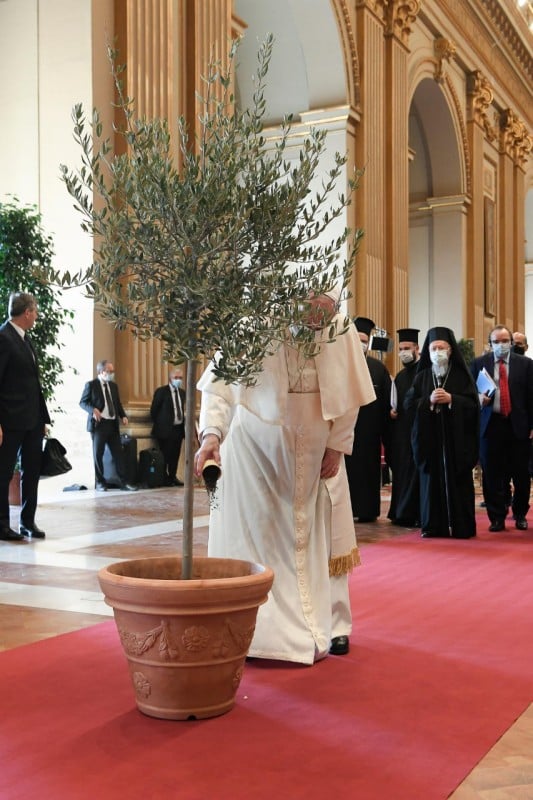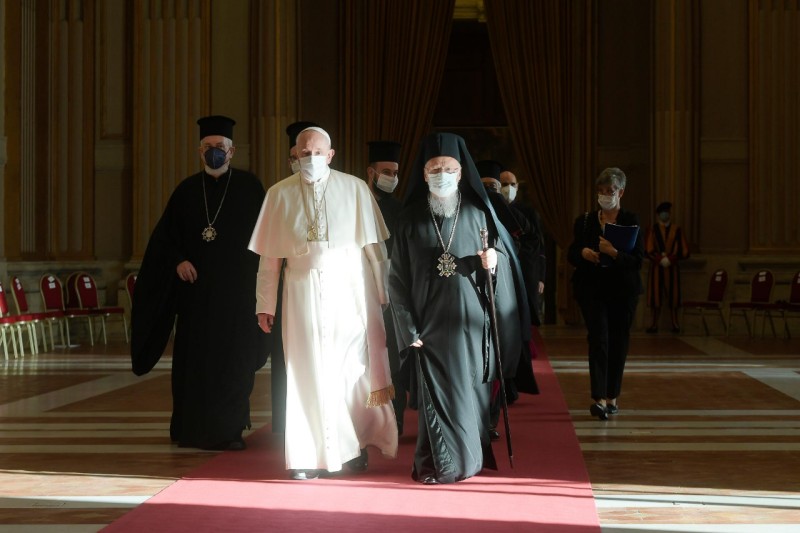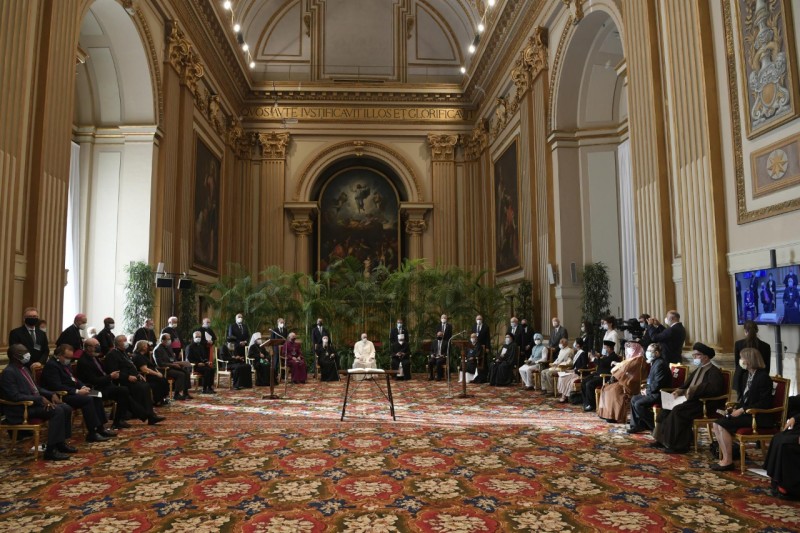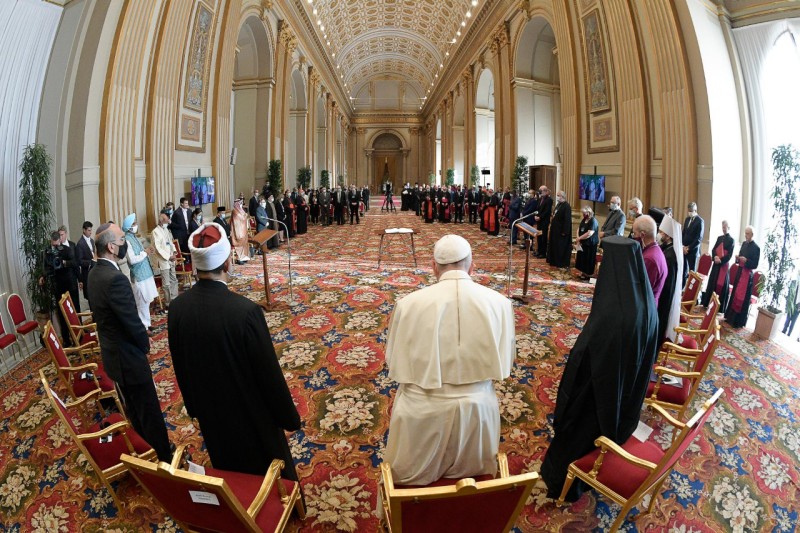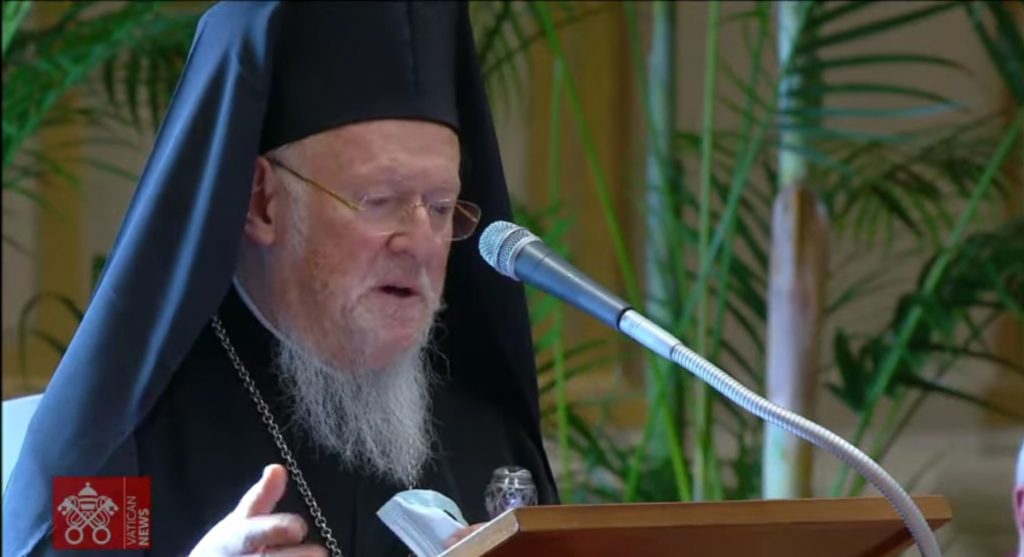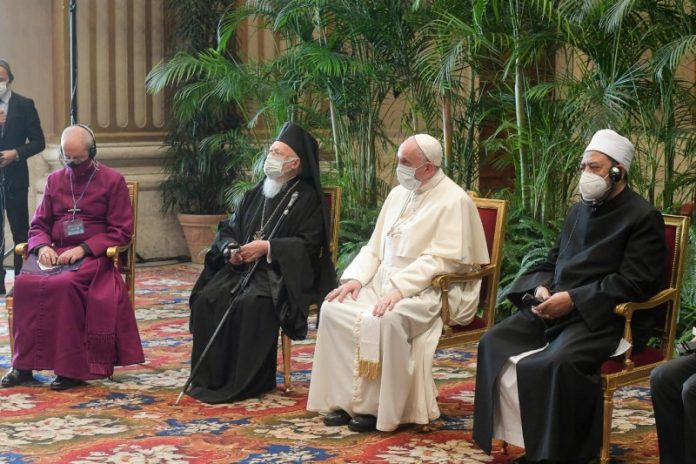ADDRESS OF HIS HOLINESS POPE FRANCIS TO THE PARTICIPANTS IN THE MEETING “FAITH AND SCIENCE: TOWARDS COP26”
Religious Leaders and Representatives,
Excellencies,
Dear Friends,
Thank you for your presence, which clearly shows our desire for a deepened dialogue among ourselves and with scientific experts. I would like to propose three concepts that can guide our reflection on this shared endeavour: openness to interdependence and sharing, the dynamism of love and the call to respect.
1. Everything is connected; in our world, everything is profoundly interrelated. Science, but also our religious beliefs and spiritual traditions, have stressed this connectedness between ourselves and the rest of creation. We recognize the signs of divine harmony present in the natural world, for no creatures are self-sufficient; they exist only in dependence on each other, complementing one another and in the service of one another. [1] We might even say that the Creator has given each to the other so that they can grow and reach fulfilment in a relationship of love and respect. Plants, waters and animals are guided by a law imprinted upon them by God for the benefit of all creation.
Recognizing that the world is interconnected means not only realizing the harmful effects of our actions, but also identifying behaviours and solutions to be adopted, in an attitude of openness to interdependence and sharing. We cannot act alone, for each of us is fundamentally responsible to care for others and for the environment. This commitment should lead to an urgently needed change of direction, nurtured also by our respective religious beliefs and spirituality. For Christians, openness to interdependence springs from the very mystery of the Triune God: “The human person grows more, matures more and is sanctified more to the extent that he or she enters into relationships, going out from themselves to live in communion with God, with others and with all creatures. In this way, they make their own that Trinitarian dynamism which God imprinted in them when they were created”. [2]
Today’s meeting, which brings together many cultures and spiritualities in a spirit of fraternity, can only strengthen our realization that we are members of one human family. Each of us has his or her religious beliefs and spiritual traditions, but no cultural, political or social borders or barriers prevent us from standing together. To illumine and direct this openness, let us commit ourselves to a future shaped by interdependence and co-responsibility.
2. This commitment must constantly be driven by the dynamism of love, for “in the depths of every heart, love creates bonds and expands existence, for it draws people out of themselves and towards others”. [3] Love’s driving force, however, is not set in motion once for all; it needs to be renewed daily. That is one of the great contributions that our religious and spiritual traditions can make to help bring about this much needed change of course.
Love is the mirror of an intense spiritual life: a love that extends to all, transcending cultural, political and social boundaries; a love that is inclusive, concerned especially for the poor, who so often teach us how to overcome the barriers of selfishness and to break down the walls of our ego.
This represents a challenge born of our need to counter the “throwaway culture” so prevalent in our society and resting on what our Joint Appeal calls the “seeds of conflicts: greed, indifference, ignorance, fear, injustice, insecurity and violence”. Those seeds of conflict cause the serious wounds we are inflicting on the environment, such as climate change, desertification, pollution and loss of biodiversity. These in turn are leading to the breaking of “that covenant between human beings and the environment, which should mirror the creative love of God, from whom we come and towards whom we are journeying”. [4]
The challenge to work for a culture of care for our common home, but also for ourselves, is one that inspires hope, for surely humanity has never possessed as many means for achieving this goal as it possesses today. We can face this challenge on various levels. I would like to emphasize two of them in particular: example and action, and education. Inspired by our religious beliefs and spiritual traditions, we can make important contributions in both these areas. Many opportunities present themselves, as the Joint Appeal clearly notes in pointing to the various educational and training programmes that we can develop to promote care for our common home.
3. That care is also a call to respect: respect for creation, respect for our neighbour, respect for ourselves and for the Creator, but also mutual respect between faith and science, in order to enter into a mutual “dialogue for the sake of protecting nature, defending the poor, and building networks of respect and fraternity”. [5]
Respect, in this sense, is more than an abstract and passive recognition of others. It is an empathetic and active experience of desiring to know others and to enter into dialogue with them, in order to walk together on a common journey. For, as the Appeal goes on to state, “what we can achieve depends not only on opportunities and resources, but also on hope, courage and good will”.
Openness to interdependence and sharing, the dynamism of love and a call to respect. These are, I believe, three interpretative keys that can shed light on our efforts to care for our common home. COP26 in Glasgow represents an urgent summons to provide effective responses to the unprecedented ecological crisis and the crisis of values that we are presently experiencing, and in this way to offer concrete hope to future generations. We want to accompany it with our commitment and our spiritual closeness.
________________________________________
[1] Cf. Encyclical Letter Laudato Si’, 86.
[3] Encyclical Letter Fratelli Tutti, 88.
[4] BENEDICT XVI, Encyclical Letter Caritas in Veritate, 50.
[5] Encyclical Letter Laudato Si’, 201.
